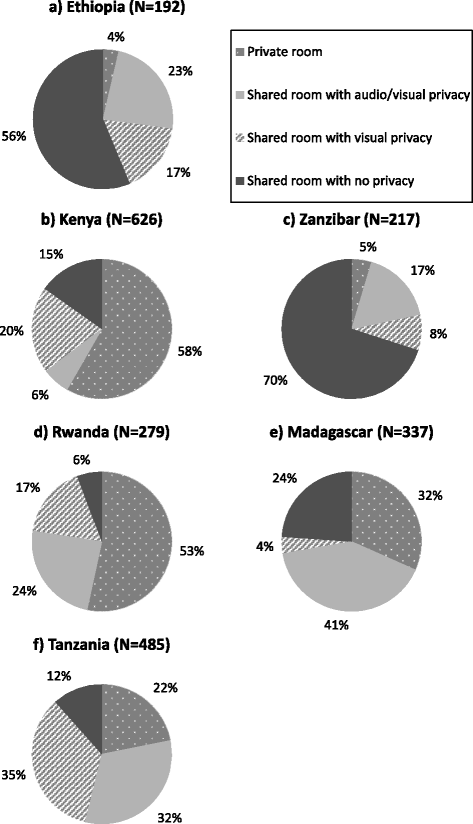Direct observation of respectful maternity care in five countries: a cross-sectional study of health facilities in East and Southern Africa
- PMID: 26596353
- PMCID: PMC4657214
- DOI: 10.1186/s12884-015-0728-4
Direct observation of respectful maternity care in five countries: a cross-sectional study of health facilities in East and Southern Africa
Abstract
Background: Poor quality of care at health facilities is a barrier to pregnant women and their families accessing skilled care. Increasing evidence from low resource countries suggests care women receive during labor and childbirth is sometimes rude, disrespectful, abusive, and not responsive to their needs. However, little is known about how frequently women experience these behaviors. This study is one of the first to report prevalence of respectful maternity care and disrespectful and abusive behavior at facilities in multiple low resource countries.
Methods: Structured, standardized clinical observation checklists were used to directly observe quality of care at facilities in five countries: Ethiopia, Kenya, Madagascar, Rwanda, and the United Republic of Tanzania. Respectful care was represented by 10 items describing actions the provider should take to ensure the client was informed and able to make choices about her care, and that her dignity and privacy were respected. For each country, percentage of women receiving these practices and delivery room privacy conditions were calculated. Clinical observers' open-ended comments were also analyzed to identify examples of disrespect and abuse.
Results: A total of 2164 labor and delivery observations were conducted at hospitals and health centers. Encouragingly, women overall were treated with dignity and in a supportive manner by providers, but many women experienced poor interactions with providers and were not well-informed about their care. Both physical and verbal abuse of women were observed during the study. The most frequently mentioned form of disrespect and abuse in the open-ended comments was abandonment and neglect.
Conclusions: Efforts to increase use of facility-based maternity care in low income countries are unlikely to achieve desired gains if there is no improvement in quality of care provided, especially elements of respectful care. This analysis identified insufficient communication and information sharing by providers as well as delays in care and abandonment of laboring women as deficiencies in respectful care. Failure to adopt a patient-centered approach and a lack of health system resources are contributing structural factors. Further research is needed to understand these barriers and develop effective interventions to promote respectful care in this context.
Figures
References
-
- World Health Organization Maternal mortality: helping women off the road to death. WHO Chron. 1986;40(5):175–183. - PubMed
-
- Hodgins S. What happens after women come through the door? Glob Health. 2011;Spring 2011(10):12.
Publication types
MeSH terms
LinkOut - more resources
Full Text Sources
Other Literature Sources
Medical


